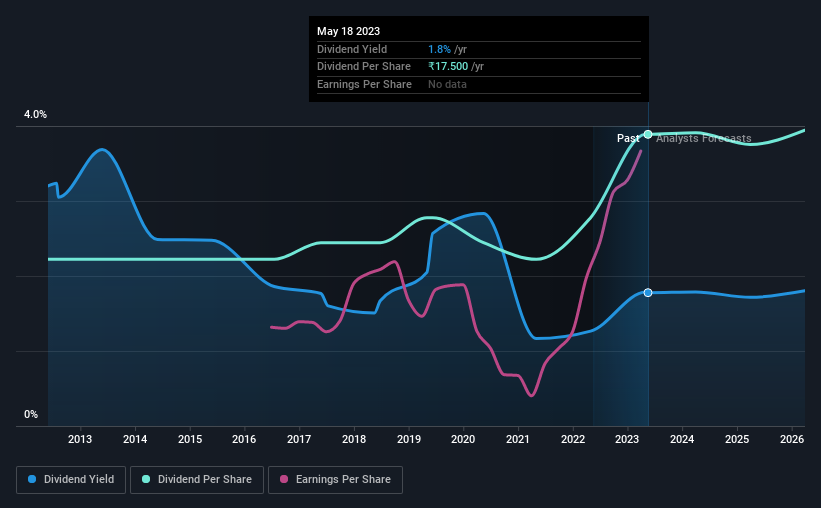Tata Chemicals (NSE:TATACHEM) Is Increasing Its Dividend To ₹17.50

Tata Chemicals Limited's (NSE:TATACHEM) dividend will be increasing from last year's payment of the same period to ₹17.50 on 26th of July. This will take the dividend yield to an attractive 1.8%, providing a nice boost to shareholder returns.
View our latest analysis for Tata Chemicals
Tata Chemicals' Dividend Is Well Covered By Earnings
We like to see robust dividend yields, but that doesn't matter if the payment isn't sustainable. Before making this announcement, Tata Chemicals was easily earning enough to cover the dividend. As a result, a large proportion of what it earned was being reinvested back into the business.
EPS is set to fall by 3.9% over the next 12 months. Assuming the dividend continues along recent trends, we believe the payout ratio could be 21%, which we are pretty comfortable with and we think is feasible on an earnings basis.

Tata Chemicals Has A Solid Track Record
The company has a sustained record of paying dividends with very little fluctuation. The dividend has gone from an annual total of ₹10.00 in 2013 to the most recent total annual payment of ₹17.50. This works out to be a compound annual growth rate (CAGR) of approximately 5.8% a year over that time. Companies like this can be very valuable over the long term, if the decent rate of growth can be maintained.
The Dividend Looks Likely To Grow
Some investors will be chomping at the bit to buy some of the company's stock based on its dividend history. We are encouraged to see that Tata Chemicals has grown earnings per share at 13% per year over the past five years. With a decent amount of growth and a low payout ratio, we think this bodes well for Tata Chemicals' prospects of growing its dividend payments in the future.
We Really Like Tata Chemicals' Dividend
Overall, a dividend increase is always good, and we think that Tata Chemicals is a strong income stock thanks to its track record and growing earnings. The earnings easily cover the company's distributions, and the company is generating plenty of cash. If earnings do fall over the next 12 months, the dividend could be buffeted a little bit, but we don't think it should cause too much of a problem in the long term. All in all, this checks a lot of the boxes we look for when choosing an income stock.
Companies possessing a stable dividend policy will likely enjoy greater investor interest than those suffering from a more inconsistent approach. However, there are other things to consider for investors when analysing stock performance. Companies that are growing earnings tend to be the best dividend stocks over the long term. See what the 7 analysts we track are forecasting for Tata Chemicals for free with public analyst estimates for the company. If you are a dividend investor, you might also want to look at our curated list of high yield dividend stocks.
If you're looking to trade Tata Chemicals, open an account with the lowest-cost platform trusted by professionals, Interactive Brokers.
With clients in over 200 countries and territories, and access to 160 markets, IBKR lets you trade stocks, options, futures, forex, bonds and funds from a single integrated account.
Enjoy no hidden fees, no account minimums, and FX conversion rates as low as 0.03%, far better than what most brokers offer.
Sponsored ContentValuation is complex, but we're here to simplify it.
Discover if Tata Chemicals might be undervalued or overvalued with our detailed analysis, featuring fair value estimates, potential risks, dividends, insider trades, and its financial condition.
Access Free AnalysisHave feedback on this article? Concerned about the content? Get in touch with us directly. Alternatively, email editorial-team (at) simplywallst.com.
This article by Simply Wall St is general in nature. We provide commentary based on historical data and analyst forecasts only using an unbiased methodology and our articles are not intended to be financial advice. It does not constitute a recommendation to buy or sell any stock, and does not take account of your objectives, or your financial situation. We aim to bring you long-term focused analysis driven by fundamental data. Note that our analysis may not factor in the latest price-sensitive company announcements or qualitative material. Simply Wall St has no position in any stocks mentioned.
About NSEI:TATACHEM
Tata Chemicals
Manufactures, markets, sells, and distributes basic chemistry and specialty products in India, Europe, Africa, America, rest of Asia, and internationally.
Adequate balance sheet average dividend payer.
Similar Companies
Market Insights
Community Narratives



